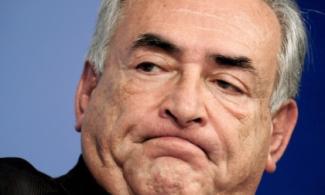
The Bronx Supreme Court has determined that the civil case filed against Dominique Strauss-Kahn must be heard, following the former International Monetary Fund chief’s failure to convince a judge that he is immune from a sexual assault lawsuit filed against him, writes Christine Simmons of the New York Law Journal.
The Bronx Supreme Court has determined that the civil case filed against Dominique Strauss-Kahn must be heard, following the former International Monetary Fund chief’s failure to convince a judge that he is immune from a sexual assault lawsuit filed against him, writes Christine Simmons of the New York Law Journal.
"At a time when issues concerning human rights significantly shape today's international law, customary or otherwise, it is hardly an assault on long standing principles of comity among nations to require those working in this country to respect our laws as Americans working elsewhere must respect theirs," wrote Justice Douglas McKeon. A hotel maid, Nafissatou Diallo, filed charges against Strauss-Kahn last August, alleging he engaged three months earlier in a "violent and sadistic attack" against her at the Sofitel New York in midtown Manhattan. The Manhattan District Attorney's Office chose not to prosecute. McKeon said in Diallo v. Strauss-Kahn, 3070655/1, that Strauss-Kahn enjoyed some type of immunity. Absolute immunity, the judge said, would spare him from criminal or civil liability in the United States, even on matters that are strictly personal and unrelated to the IMF. Functional immunity, however, would spare him in matters in which he was only acting in his IMF capacity and would not benefit him in this case. McKeon ultimately concluded that Strauss-Kahn failed to establish that he enjoyed absolute immunity against Diallo's allegations, which were unrelated to his duties as IMF chair. Strauss-Kahn has denied the maid's allegations all along, but has conceded that whatever happened in the hotel was not in furtherance of the IMF's business. Strauss-Kahn resigned shortly after the incident, which doomed his candidacy for president of France. Attorneys for Strauss-Kahn, Zuckerman Spaeder partners William Taylor III and Amit Mehta, and Hugh Campbell, a partner at Rodman & Campbell in the Bronx, said in a statement yesterday that they are disappointed by the ruling. Strauss-Kahn "is determined to fight the claims brought against him, and we are confident that he will prevail," the statement said. Kenneth Thompson and Douglas Wigdor, partners at Thompson Wigdor who represents Diallo, said they are "extremely pleased" by McKeon's "well reasoned and articulate decision." "We have said all along that Strauss-Kahn's desperate plea for immunity was a tactic designed to delay these proceedings and we now look forward to holding him accountable for the brutal sexual assault that he committed," Wigdor and Thompson said in a statement. In support of his findings on functional immunity, McKeon cited the IMF's Articles of Agreement giving immunity to IMF employees "with respect to acts…in their official capacity." The judge also cited the International Organizations Immunity Act, enacted in 1945, which states that representatives of foreign governments or international organizations shall be immune from suits relating to acts "in their official capacity" and falling within their functions. Strauss-Kahn argued that another agreement, the Convention on the Privileges and Immunities of the Specialized Agencies, adopted by the United Nations General Assembly, gives absolute immunity protection for the executive heads of agencies. The United States is not a party to the convention, but Strauss-Kahn's lawyers argued that the convention has become widely adopted and has achieved the status of "customary international law." Justice McKeon said the International Organizations Immunity Act, not customary international law, "controls the nature of immunity" for Strauss-Kahn. Strauss-Kahn was arrested on May 14 and resigned from his IMF post on May 18. Diallo filed her civil suit against him on Aug. 8. The district attorney's office released his travel documents to his counsel on Aug. 25, enabling the French politician to leave the U.S. for the first time since his arrest. Lawyers for Strauss-Kahn had cited the Vienna Convention on Diplomatic Relations, which they claim says that privileges and immunities can be extended past the resignation of an individual as long as he leaves the country within a reasonable period of time. Addressing this argument, McKeon said that to claim this extension under the Vienna Convention, Strauss-Kahn "had to be more than a diplomatic envoy" or diplomatic agent. The judge said that Strauss-Kahn had to be a member of a mission, "which clearly he was not." He said the purpose of a Vienna Convention provision was to protect members of a mission whose diplomatic tour has ended but whose return home has been delayed. "As the expression goes, Mr. Strauss-Kahn 'up and quit' months before service was effectuated in this action. He was neither an employee of the IMF, a diplomatic envoy or diplomatic agent let alone a member of a diplomatic corps after May 18, 2011," McKeon wrote. Finally, the judge was critical of Strauss-Kahn's decision to assert immunity in the civil suit, but waive it in the criminal proceedings. During oral arguments, his attorneys said it wasn't in Strauss-Kahn's interest to raise a defense that seemed purely procedural. "It was in his interests to fight the charges," Mehta told the judge in a hearing earlier this year. But McKeon wrote: "Strauss-Kahn cannot eschew immunity in an effort to clear his name only to embrace it now in an effort to deny Ms. Diallo the opportunity to clear hers."googletag.cmd.push(function() { googletag.display('content1'); });
googletag.cmd.push(function() { googletag.display('comments'); });
googletag.cmd.push(function() { googletag.display('content2'); });